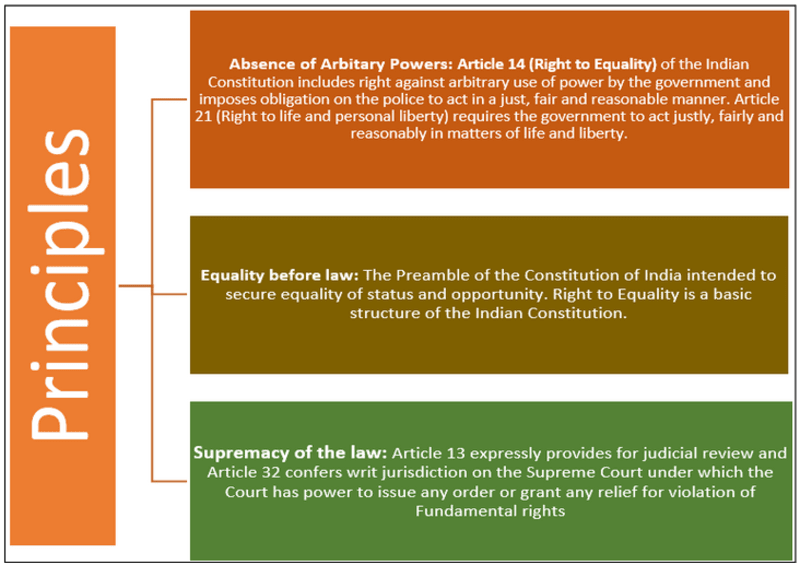Downfall of Police Ogre
News Excerpt:
Recently several allegations of the violations of human rights mostly by police officers have garnered attention.
Case Study:
There was a case in Ranchi in which a lady named Rita Dhawan filed a complaint before the NHRC Commission about her husband Suresh Dhawan, who was waylaid and shot dead by the police. The police, led by an inspector, had surrounded his car and demanded Rs 1 lakh rupees and on his refusal to cough up the amount, shot and killed him. The police, on the other hand, had dubbed him as a Naxalite who had challenged and opened fire at them. After the case came to court, The police Inspector and his cohorts were convicted and sentenced to death and a penalty of RS 10 lakhs by the commission. The State government opposed the penalty but was later compelled to go with the Commission. This case also unveiled the shady and seamy past of Inspector Dudh Nath Ram, who was earlier a member of a dacoit gang and murdered against him. Utilising his proximity to the Chief Minister, he got a sub-inspector job in the police without proper verification of his antecedents. These are the reasons why he remained corrupt during his tenure and committed this many crimes in uniform.
Beyond Editorial:
Human Rights Violation by the Police
Some extent of the use of force is legally built into the role of the police.
-
The police are permitted to use force under certain circumstances mainly in case of arrests and searches.
-
If a person resists arrest or attempts to evade it, the police officer may use 'all means necessary to effect the arrest except that these means should not cause the death of a person unless that person is accused of an offence punishable with death or life imprisonment.
-
The Human Rights violations committed by the police take several forms, beginning with illegal detention/arrest, false implications, use of torture that may lead sometimes to deaths in custody. Cases are also reported about rapes in police custody and disappearances. Every year NHRC receives several complaints against the police
Problems arising in front of NHRC regarding Police
-
Investigation of Crimes: Because of increased crime rates, poor conviction rates, multiple vacancies, and overwhelmed police officers, the quality of criminal investigation has declined. Police officers lack the essential training and expertise to conduct professional investigations. They also lack legal understanding (on matters such as evidence admissibility), and their forensic and cyberinfrastructure is both inadequate and outdated.
-
Corruption: Police corruption is a specific form of police misconduct designed to obtain financial benefits, other personal gain, or career advancement for a police officer or officers in exchange for not pursuing, or selectively pursuing, an investigation or arrest.
-
-
Article 7 of the United Nations Code of Conduct for Law Enforcement Officials says that ‘Law enforcement officials shall not commit any act of corruption.
-
A study conducted by the National Council of Applied Research (NCAER) about the living and working conditions of constabulary in Delhi and Uttar Pradesh reveals that 53% and 43% of constables in Uttar Pradesh and Delhi respectively were transferred from one District to another or from one place to another in less than a year. Corruption seems to have become a way of life in the country.
-
-
Encounters: “Encounter killings” are frequent, especially in Uttar Pradesh, Kashmir and the north-eastern region. These encounter killings lead to the overall loss of trust between the justice and the people as so many complaints were there that they misused this power for the politicians and themselves.
About the Rule of Law and Police:
- Rule of Law runs as a golden thread through the fabric of the Indian Constitution. The following three important principles of the Rule of Law are reflected in the Indian Constitution and applicable to police in their everyday activities.

Position of Police Forces in India:
-
The police are the first visible point of contact of citizens. It is the only agency with the widest possible contact with the people. Police functions are mostly prohibitive and regulatory and this leaves an impression on the individual citizens that police interfere with the life, liberty and freedom of the people.
-
Whenever violations of human rights by police are reported it causes an overall effect of loss of faith in the police as a protector and upholder of citizens rights. The failure to respect human rights in everyday police processes alienates public sympathy and support, which leads to undermining the people's confidence in police.
The purpose and objectives of Police in a democratic society are:
-
Prevention and detection of crime
-
Maintenance of public order.
-
Respect for the rule of law.
-
Respect for the dignity of the human person.
-
Respect for freedom, liberty and rights of citizens.
Case Study: One of the studies about people's perception of police in the state of Rajasthan revealed the following facts. The public opinion was that only 11% interacted with the police and about 89% never met the police. Among these 24% were from cities and 17% from rural areas. Only 5% of women interacted with police. This reflects the gap between the police and the public and also the fact that the public, especially women avoid interaction with police in general.
Role of Police in Democracy:
The Police Act of 1861 visualised the role of the police as a mere law enforcement agency.
-
The National Police Commission (1978) suggested that the police should assume a service-oriented role of which law enforcement is only a part.
-
It further pointed out that due recognition is to be given to the police stations as the basic unit of contact between the people and the police.
-
The National Police Commission also recommended that the entire police philosophy, culture and attitude should be such as to make a police station appeal and function as a ready source of relief for people in distress situations.
-
The police in a democratic society are required to perform multifarious functions, besides the maintenance of law and order. Social legislation has added a new dimension to the role of the police. The role of the police has been redefined to include the values of democratic polity, secularism, social justice, human dignity and building up a democratic image of police to serve the community.
Case study: The Delhi Police passed an externment order against one Premchand alleging that he was initiating unlawful activities in Connaught Place and nearby places wielding a knife.
Premchand denied the allegations and stated that he was used as a stock witness in about 3000 cases in the past 25 years by the police officers in Delhi. He was forced by the police to give false testimony to safeguard his business and family.
Police Accountability:
-
According to the police legislation, both the central and state police forces are subject to the supervision and control of political leaders. Police priorities are continuously shifting in response to political leaders' requests. This impairs police officers' ability to make professional decisions (for example, how to respond to law and order situations or conduct investigations), resulting in biased task performance.
-
While state police are in charge of maintaining law and order and investigating crimes, central forces support them with intelligence and internal security concerns (for example, insurgencies). Police spending accounts for roughly 3% of national and state government expenditures.
About Status of Policing In India Report 2023:
The Status of Policing in India Report 2023 theme is surveillance and privacy.
-
The number of CCTV cameras with the police is significantly lower than the number of cameras within the cities.
-
States such as Delhi (in 2015) and Himachal Pradesh (in 2020) launched predictive policing strategies, which include crime mapping and analytics using artificial intelligence (AI) algorithms for future predictions of crimes and mapping out ‘hotspots’ for certain types of crimes.
-
It was felt that the public views surveillance as an effective tool for public safety and national security.
-
The use of Automated Facial Recognition System (AFRS) software to screen crowds at anti-government rallies is another instance of potential misuse of technology by the police.
Status of Policing in India Report 2019 by Common Cause and Centre for the Study Developing Societies, highlights the dismal work conditions in which the police operate in the country.

Supreme Court Directions in Prakash Singh vs Union of India (2006)
-
There should be setting up of State Security Commission to lay down broad policies and give directions for the performance of the preventive tasks and service-oriented functions of the police;
-
There should be the establishment of a Police Establishment Board, comprising the Director General of Police and four senior officers in each State, which decides transfers, postings, promotions and other service-related matters for officers below the rank of Deputy Superintendent of Police.
-
There should be a Police Complaints Authority at district and State levels to inquire into complaints of police misconduct.
-
The Director General of Police would be selected from among the three most senior officers empanelled for promotion with a minimum tenure of two years.
-
The Court also ordered the separation of investigating police from the law-and-order police to ensure speedier investigations, better expertise and improved rapport with the public.
Conclusion:
In a democracy like India, the police system is critical to implementing the country's laws. As a result, such an important arm of the government must be given more attention, and many reforms must be implemented to ensure the system's smooth operation. The solution is dependent on innovative thinking within state police administrations and on the part of police leadership to meet the challenge of the new political and administrative philosophies of democracy, socialism, secularism, and nationalism, as incorporated in the amendments to the Constitution of India.

